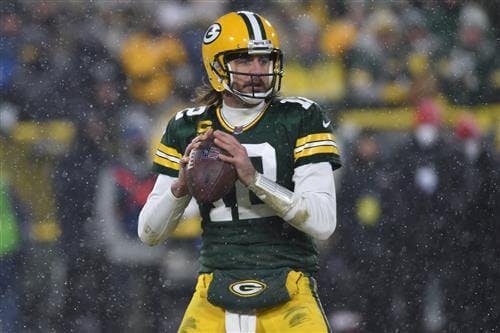
From Robert Dalton (@RobertDalton02): What would a Jets package for Aaron Rodgers look like?
Robert, let’s say this year’s second-rounder (43rd) and a conditional 2025 pick that’ll ride on how well Rodgers plays, and whether he plays in ’24. I might be wrong, but based on what I know, I don’t think the Jets will have to give up this year’s first-round pick.
From Seán (@sonofmalachynyc): Will NYJ have to trade No. 13 in any potential deal for Aaron Rodgers?
Seán, I don’t think so. And there’s a valuable lesson in that, in the end, it may not even cost the Jets a first-round pick to get Aaron Rodgers. When you trade a player, the trade isn’t simply the player’s skill level at the time of the deal. It’s about his contract. It’s about his age. It’s about the number of teams that are interested. In this case, those things are working against Green Bay GM Brian Gutekunst.
• The contract gives Rodgers all the leverage. He’s due a $58.3 million option bonus (which prorates over four years for a new team), plus a $1.165 million base. I don’t know whether the Jets are willing to pay him $59.465 million in 2023, or if they’d be looking for a discount on that. What I do know is neither they, nor any other team, will trade for Rodgers’s contract without knowing Rodgers is on board with going. And the number also works to crush his trade value, because the more you pay in cash, the less you’re willing to give up in picks.
• Rodgers turns 40 in December. That means, if you’re another team, you’re not looking at five years from him—like the Browns (Deshaun Watson) or Broncos (Russell Wilson) or Rams (Matthew Stafford) could reasonably expect from the quarterbacks they got in trades. In this case, it’s year-to-year, and a second year won’t come cheap. He’s due a $47 million base and $2.25 million base in 2024, when he’ll turn 41. (Remember, when you trade first-round picks, you’re trading five years of control over ascending talents.)
• Because of this, among other factors, there’s a narrow path to landing Rodgers. You have to have the money and be willing to pay it. You have to have a win-now roster, otherwise you wouldn’t be pursuing him in the first place. You have to have flexibility to add players he might want to bring with him. You have to have a coaching staff he wants to work with, and geography that he likes. It’s a lot of boxes to check. It’s why, in the end, there were really only two teams in the running for Tom Brady. I can’t imagine there’ll be many more for Rodgers.
That, by the way, isn’t an affront to Rodgers as a player—he can still play, and we’ve seen what happens with motivated all-time greats (Brady, Brett Favre, Joe Montana) when they land on new teams. It’s just the way NFL trades work. They’re about way more than just how good a player is. Which is why I don’t think trade comp will be a stumbling block at all, if there’s a Jets-Packers deal to be done here.